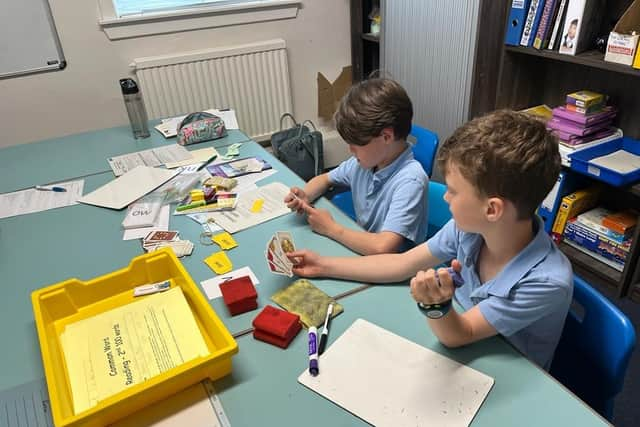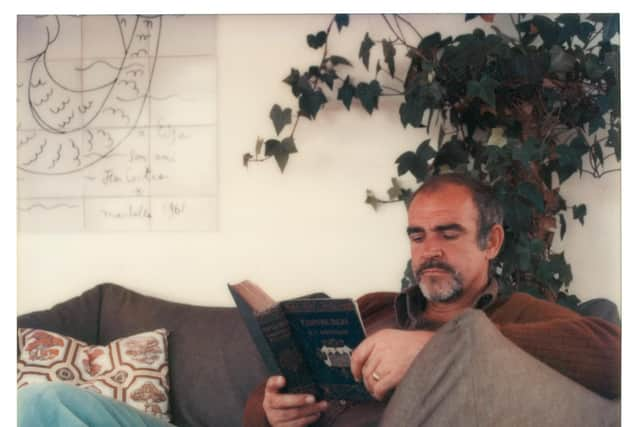Pioneering dyslexia scheme funded by Sean Connery's family leads to 'significant' improvements for Edinburgh pupils
Children with dyslexia in Edinburgh are “flourishing” in the wake of investment in support services from a fund set up in the memory of Sir Sean Connery.
The Scotsman can reveal the initial results from the pioneering project in Scotland’s capital show individual children are making “significant” progress with their reading.
Advertisement
Hide AdAdvertisement
Hide AdHopes are now growing that learning from the scheme could soon be rolled out to local authorities across the country.


The Sean Connery Foundation launched last year to honour the legacy of the Edinburgh-born actor by distributing millions of pounds in Scotland and his adopted home of the Bahamas.
The James Bond star’s son has said that learning to read was the single most important event in Sir Sean’s life, and that the family wanted to help “unlock this genius” in others by providing funding to establish The Sean Connery Foundation Dyslexia Initiative.
The scheme is a partnership between the City of Edinburgh Council, Dyslexia Scotland and the foundation.
It builds on Edinburgh’s established literacy/dyslexia support team in order to provide intensive programmes to more pupils.


Teachers and pupil support assistants receive bespoke training courses before being deployed on secondments to schools across Edinburgh.
So far, 175 teaching staff have been given whole school training, with 215 pupils benefitting from extra support.
An analysis of the work to date found all teachers and pupils involved were positive about its impact, with data suggesting “individual children are flourishing as a result of the initiative”.
Advertisement
Hide AdAdvertisement
Hide AdEven in just nine weeks of intervention, it was found that individual children were making “significant progress in their reading”.


An interim report said: “If such improvements are sustained longer term it is highly likely that the impact of the project will demonstrate statistical significance.”
Hilary Aitken, chartered teacher lead with the council’s literacy/dyslexia support team, said the teams had worked in 15 primaries and two secondaries this year.
"In the past, schools would make referrals to the team and my teachers would go out and work with one learner, very specifically,” she said.
"Now, the schools aren’t making referrals, we’re looking at going to schools where there is most need, and working in these schools first.
"In a sense it is a game-changer, because many of the schools we’re now working in are schools where they didn’t necessarily have the resources to make referrals to us.
"The numbers we’re working with are much, much bigger than previously because we were very much a small team working with individuals."
Ms Aitken said it was not only pupils and staff who were benefitting from the initiative.
Advertisement
Hide AdAdvertisement
Hide Ad"The results are really positive. The results in terms of reading levels... there is significant movement in terms of progress for the children,” she said.
"But for me the most interesting feedback has come from the other thing we do, which is the parent/carer group.“What has worked really well is looking at the strategies parents can use to support literacy at home, and then practising with the children – so the children come into the parent/carer group and they are there working with their parents.
"The feedback we’ve had from that has been excellent. Parents very much saying, ‘I didn’t really understand it before, and now I know how to help my child, I get them’.”
Mary Berrill, a former school inspector who has been involved in assessing the the impact of the scheme as a consultant for Dyslexia Scotland, said it was vital to gather evidence.
"It’s about short-sharp targeted support from highly-trained specialists. We know it works but this has given us the opportunity to fund it, but also to evidence that it works,” she said.
"It’s about constantly evaluating progress. If you have evidence that this targeted support or this programme or this approach is working, then you do more of it and you do less of what is not working well.
"This whole programme is very data rich. It is very much rooted in evidence – evidence around the child, and that includes the wellbeing of the child, it’s not just about progress in literacy.
"And that is an important message for Scotland. We need to know what difference we’re making.”
Advertisement
Hide AdAdvertisement
Hide AdCathy Magee, chief executive of Dyslexia Scotland, said she hoped other parts of the nation would be able to benefit.
"Certainly the Sean Connery Foundation grant was donated in the hope that if the programme was successful it would attract funding in future from other funders, including from the Scottish Government, from local authorities, and potentially other philanthropists or trusts,” she said.
"So that its impact would be national rather than in one particular area.
"As with any programme that is testing the waters, you’re never guaranteed that the intervention will be taken up or that the learning will be embedded.
"And in the current financial climate as well we have to be realistic about what might happen, but in terms of the model that is being used, the programme is adding to an existing model.
"Edinburgh already had this dyslexia unit, and there are some other local authorities that have a unit for dyslexia support, and our experience is that the support those units give is invaluable.
"Certainly that is what we would recommend. If local authorities can put investment in, it’s really, really important to have a dedicated unit within the local authority that can actually help support the teachers.”
Ms Magee said the learning was emerging while major changes were being planned in Scottish education, following a series of recent reports.
Advertisement
Hide AdAdvertisement
Hide Ad"I think it is a crucial time. There’s a huge reform of education going on at the moment and there is lack of support in some areas for dyslexic children,” she said.
"Based on our experience of the current situation, we think it is vital for investment to be made to ensure a more consistent, early intervention and support.”
Comments
Want to join the conversation? Please or to comment on this article.
